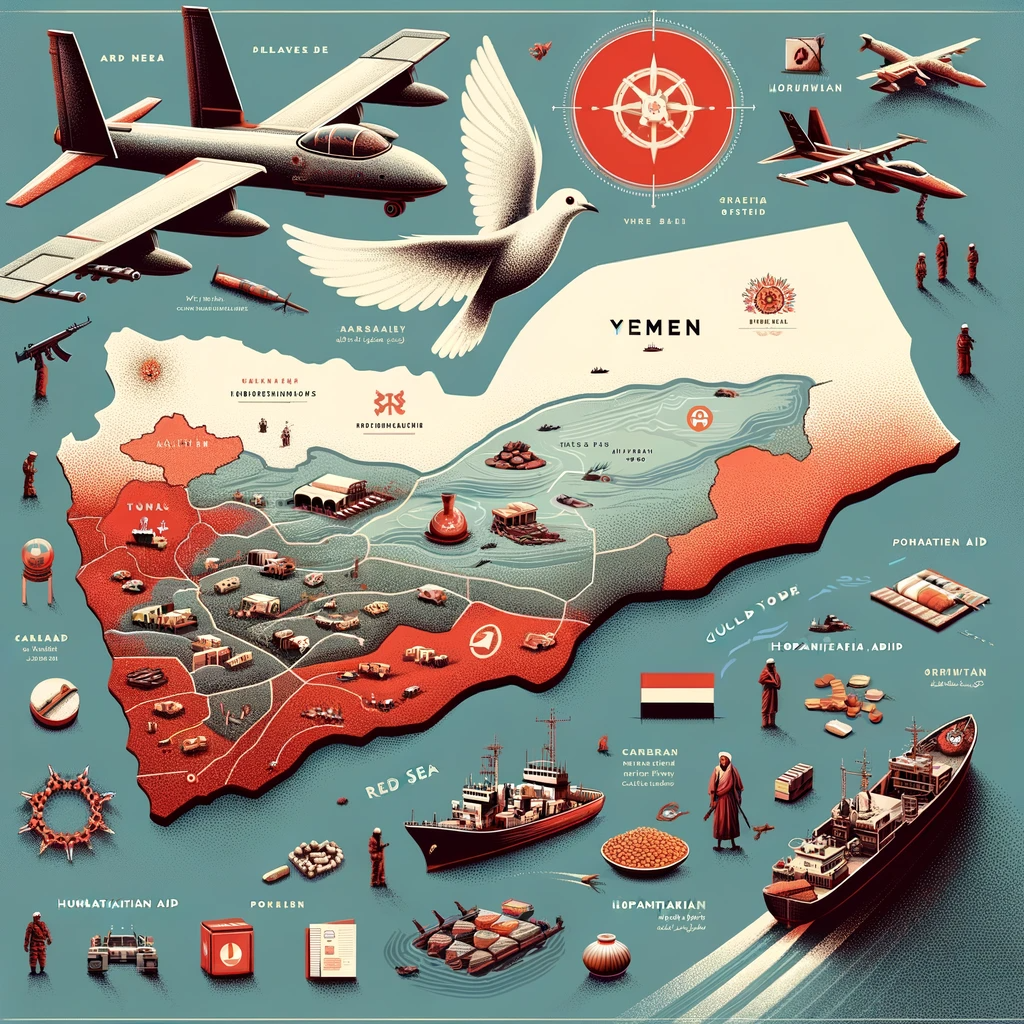The situation in Yemen has recently gotten worse, especially after Houthi rebels attacked a US-owned ship in the Gulf of Aden. Let’s break down what’s happening in Yemen, how it’s messing with global trade and politics, and why it matters.

What’s Up with the Houthi Drone Attack?
Trouble in the Gulf of Aden
Houthis used drones to hit the “Genco Picardy,” a ship owned by the US. This happened right after the US called the Houthis global terrorists again, showing how tense things are in this important area for ships.
How the US is Reacting
The US is hitting back hard. They’ve frozen the money of the Houthi group and won’t let its members into the US. It’s a big move against these rebels, who Iran supports.
Digging Deeper into Yemen’s Problems
The Humanitarian Side
Yemen’s civil war started getting really bad in 2015, and now it’s one of the biggest humanitarian crises in the world. Millions of people need help there. How the world responds, especially with aid, is super important.
Big Countries Getting Involved
Countries like the US and UK are really involved, even bombing Houthi targets. What US Secretary of State Antony Blinken decides about putting Houthis on the terrorist list and the US’s plan for Yemen can change a lot in this conflict.
How This Messes with Global Trade
Houthis Hitting Ships
Houthis keep attacking ships in the Red Sea. This is a big deal because it’s a super busy route for global trade. These attacks make it risky and complicated for international trade and security.
The World’s Reaction
The world is trying to stop these attacks with things like air strikes and sanctions. But it’s still up for debate if these actions are really making it safer for big cargo ships.
So, that’s the scoop on the Yemen crisis. It’s a complex situation with global implications, especially in how it affects trade and international relations.

FAQ Section for the Yemen Crisis Article
Here’s a Frequently Asked Questions (FAQ) section to help further clarify the situation in Yemen and its broader impacts:
Q1: Who are the Houthis?
A1: The Houthis are a rebel group in Yemen. They’re backed by Iran and have been fighting the Yemeni government since around 2015. This group has taken control of large parts of Yemen, including the capital, Sana’a.
Q2: Why is the Gulf of Aden important?
A2: The Gulf of Aden is crucial because it’s a key maritime route. Lots of global trade happens through this area, making it a hotspot for international attention, especially when conflicts like the Yemen crisis affect its stability.
Q3: What are the US sanctions against the Houthis about?
A3: The US has put financial sanctions on the Houthis, which means freezing their funds and banning their members from entering the US. This is a way to pressure the group because of their actions and their ties to Iran.
Q4: How does the Yemen crisis affect global trade?
A4: The crisis affects global trade mainly through the Houthis attacking ships in the Red Sea. This area is a major path for international shipping, so any threat here can disrupt trade routes, affect oil prices, and raise security concerns.
Q5: What’s the humanitarian situation in Yemen?
A5: Yemen is facing a severe humanitarian crisis. The ongoing war has led to shortages of food, clean water, and medical supplies. Millions of people are in need of humanitarian aid.
Q6: How are other countries involved in Yemen?
A6: Various countries are involved in different ways. The US and UK, for example, have conducted air strikes against Houthi targets. Iran is said to support the Houthis. This international involvement makes the conflict more complex.
Q7: Are there any peace efforts in Yemen?
A7: Yes, there have been several attempts at peace talks and ceasefires, but they’ve had limited success. The situation is complicated, and finding a solution that satisfies all parties has been challenging.
Q8: How can I help the people in Yemen?
A8: You can help by donating to international aid organizations that work in Yemen, staying informed about the crisis, and spreading awareness. Every bit of support counts in such a humanitarian crisis.
Sources BBC



Pingback: The Gulf of Aden Tanker Attack - Linkdood Technologies